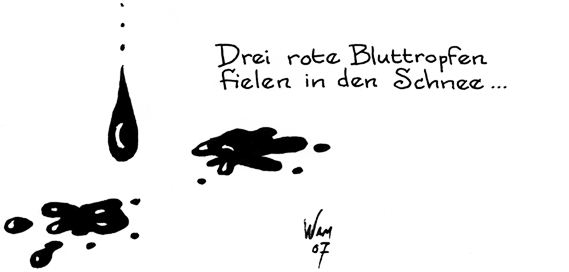![]() Adjectives:Adjektive ohne Artikel
Adjectives:Adjektive ohne Artikel
![]() Unpreceded attributive adjectives
Unpreceded attributive adjectives
Attributive adjectives (in contrast with predicate adjectives) are placed before the noun and take endings in both the basic and comparative/superlative forms depending on the gender, number and case of the noun they describe.
Most often unpreceded adjectives, like the name suggests, have no article (or determiner) before them. The term 'unpreceded' may be a misnomer, however, since adjectives can be preceded by such determiners as einige, ein wenig, ein bisschen, ein paar, einige, etwas, viele, wenige or numbers (e.g., 20, 100) and still take the so-called strong endings. These endings apply whether the adjective is in the basic form or in the comparative or superlative forms.
| Als Schneewittchens Mutter am Fenster saß, fielen weiße Schneeflocken vom Himmel. Deswegen wurde das kleine Mädchen, das sie gebar, Schneewittchen genannt: weiß, wie der Schnee ... | When Snow White's mother sat at the window, white snow flakes were falling from the sky. That's why the little girl was called Snow White: white as the snow ... |
| Drei rote Bluttropfen fielen in den Schnee, als die Königin sich mit einer Nadel in den Finger stach. | Three red drops of blood fell on the snow when the queen pierced her finger with a needle. |
To determine the correct adjective ending, determine the gender of the noun the adjective describes (masculine, feminine, neuter, or plural), then determine what case the noun is in the sentence or phrase (nominative, accusative, dative, or genitive).
| Nominativ | Akkusativ | Dativ | Genitiv | |
| Maskulin | barmherziger Jäger | barmherzigen Jäger | barmherzigem Jäger | barmherzigen Jägers |
| Feminin | unbarmherzige Königin | unbarmherzige Königin | unbarmherziger Königin | unbarmherziger Königin |
| Neutral | barmherziges Mädchen | barmherziges Mädchen | barmherzigem Mädchen | barmherzigen Mädchens |
| Plural | barmherzige Zwerge | barmherzige Zwerge | barmherzigen Zwergen | barmherziger Zwerge |
![]() Exceptions
Exceptions
Changes in the basic form
When adjectives that end in -el, -en or -er in the basic form get an adjective ending, they drop the -e- before the final consonant and add the endings to this new form (see the example with dunkel).
| Die Königin hofft, dass ihre Tochter dunkle Haare hat wie Ebenholz. | The queen hopes that her daughter has dark hair like ebony. |
Colors
Some adjectives with foreign origins (many of these words end in a vowel) do not take adjective endings: lila, pink, rosa, beige, prima, super, etc.
| Tja, mit einem Mädchen mit pink oder lila Haaren wäre die Geschichte gar nicht so beeindruckend gewesen! | Yeah, with a little girl with pink or purple hair, the story would not have been made quite an impression! |


